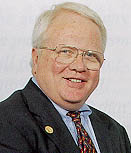|
Letter from
Phil Kirk
 The
Good and Bad of 'No Child Left Behind' The
Good and Bad of 'No Child Left Behind'
The new federal education
legislation known as “No Child Left Behind” is a powerful tool for improving
the lot of all children and especially those who have had the greatest
difficulty in school. It’s one thing to Leave No Child Behind, as this federal
law requires, and quite another to find and keep the teachers who will bring
every child up to speed.
For local school districts, the same federal education legislation that promises
sweeping changes in how schools are evaluated also presents major challenges in
school staffing. For the first time, this law sets a national standard for
teacher qualifications and, in the process, eliminates emergency teaching
licenses and other stop-gap measures that many schools have had to use to meet
teacher demands in the past.
Recently, Gov. Mike Easley released findings from a statewide survey of teachers
that showed that, overall, teachers are not satisfied with their working
conditions. In particular, teachers feel that they do not have ample time to do
their jobs, especially time to work on curriculum, classroom management and
individual instruction, and time to collaborate with colleagues and to
participate in professional development. In general, teachers in smaller schools
are more satisfied than their colleagues in larger schools, but teachers differ
considerably from principals in their assessments of funding for instructional
supplies and in how well they are shielded from disruptions to instructional
time.
While addressing some of these concerns would require additional money, some do
not. For example, it may not cost additional money to limit interruptions and
disruptions to the instructional and productive time that teachers have each
day. It would require the will to say no to activities that do not directly
support the goals of the school. It would not add expense to include teachers
more fully in the decision-making process in schools – another area of concern
to teachers. Adding time to the teacher work year, and providing smaller
schools, would be more expensive.
The law requires, as of the 2002-03 school year, that all newly hired teachers
who teach core subjects in Title I schools must meet its definition of Highly
Qualified. Title I schools serve large proportions of students who qualify for
free or reduced-priced lunch, and make up about half of North Carolina schools.
Core academic subjects include English, reading, language arts, mathematics,
science, foreign languages, civics and government, social studies, economics,
arts, history, geography and kindergarten through sixth grade.
All core academic teachers in every school are required to be Highly Qualified
by June 30, 2006. What does Highly Qualified mean? It means being fully licensed
by the state and certified to teach in their subject areas. For elementary
school teachers, this means a full state license and passing the elementary
Praxis II tests that are relevant to their teaching area. Teachers at the middle
and high school levels also must be fully state licensed and demonstrate subject
area knowledge. To demonstrate subject area knowledge, teachers have several
options: an undergraduate major in each academic subject taught, coursework
equivalent to an academic major, a graduate degree, a master’s level license
or above in the appropriate subject area, or National Board Certification in the
related area. These requirements will be the most difficult to meet at the high
school and middle school levels because teachers are more likely to have some
assignments that do not directly align with their teaching license.
North Carolina has made considerable progress in improving teacher quality over
the past five years. We have ranked first in the country two of the past three
years. We have strengthened our requirements, improved average teacher pay to
the range of the national average and provided new incentives for obtaining
master’s degrees and obtaining certification by the National Board of
Professional Teaching Standards.
Our state has more National Board certified teachers than any other state.
Nonetheless, recruiting teachers continues to be difficult and is made more
challenging by the new federal requirements. This is the time to consider not
only salaries and compensation, but also what makes teaching an attractive and
satisfying career. Addressing those needs as well will help us keep the teachers
that we need to Leave No Child Behind.
Return to magazine index
|